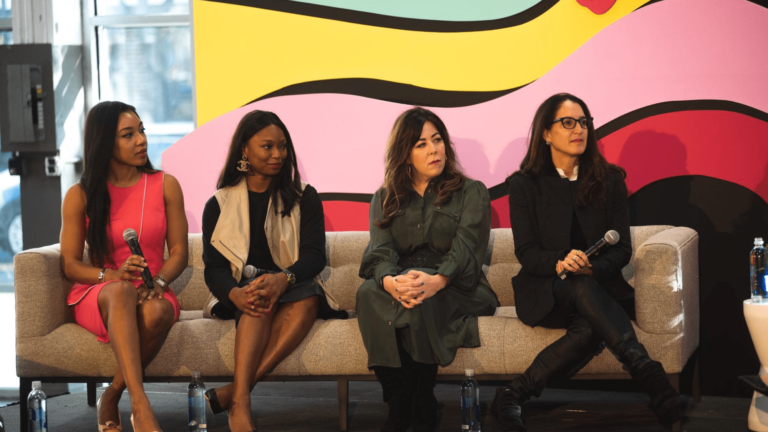So you’re an incredible event organizer looking to raise money for an amazing event or a great cause.
You aren’t prepared to settle for ‘ordinary’ — you want to throw an immersive and meaningful event.
But… you don’t have the funds because times are tough, and the cost of organizing an event isn’t getting any cheaper.
In fact, in 2024, 60% of event organizers plan to increase their ticket prices to keep their events profitable.
What you need is corporate sponsorship. Whether for a one-off donation or an ongoing sponsorship deal, working with corporate businesses can give you a much-needed ‘leg up.’
At Eventbrite, we help event organizers worldwide connect with the right people and the right sponsors. That’s why we’ve written this post. We’ll take you through how to find and get those corporate sponsorships for your next big event.
Table of contents
What sort of corporate event are you hosting?
How to get a sponsorship from a company
Developing your sponsorship pitch deck
Pro tips for finding the best companies to approach for sponsorship
Working with your corporate sponsors

What is a corporate sponsor?
A corporate sponsor is a business or organization that supports your event by donating funds, time, or other resources. Some examples of what a corporate sponsor may provide include:
- One-off donations
- 1:1 donation matching
- Resources like chairs, flyers, or a venue
- Company volunteers
- Donating products or services to raise money
It’s also not uncommon for more prominent sponsors to work together to ensure the event has everything necessary to succeed.
What sort of corporate event are you hosting?
Is it a corporate event, such as a conference, seminar, networking event, or charity gala? Before contacting potential corporate sponsors, decide what type of event you’re hosting, particularly if it’s a fundraiser. Sponsors want to know how charities will use their money.
💡Pro tip: Remember to remind potential sponsors that they’re eligible for tax deductions if they don’t receive advertising in return for their contribution to a charity event.

How to get a sponsorship from a company
Asking for corporate sponsorship is often tricky. Most organizations receive several requests throughout the year. So your goal is to make your upcoming event stand out and then contact organizations you feel would be a great match.
Here are some effective ways to land a sponsorship from a well-suited company.
1. Develop a wish list of corporate sponsors
Don’t start by randomly emailing multiple organizations; instead, make a list of potential sponsors and go from there.
Every organization you think of may not be an ideal fit for your event, but the list allows you to weed out the businesses that aren’t suitable for sponsorship. It also ensures you don’t miss an organization that can become a major sponsor.
Here are a few ideas of potential corporate sponsors to consider:
- Local businesses that have a similar goal to your charity
- Firms that can offer you a service or resource that’s needed for your event
- Companies that have previously sponsored similar events
💡Pro tip: Don’t be afraid to look into corporate sponsorship opportunities with brands that might be a bit ‘left field’ — especially if you’re hosting an unusual event. For instance, LAMC, an event organizer that hosts Latin music conferences, partnered with big names like Twitch and TikTok.
2. Start contacting potential sponsors
Okay, look. You can set up an appointment with a corporation’s CEO or CFO. But unless you’re a well-known name in the event and fundraising industry, busy corporate heads will probably decline to meet with you or may ignore your invitation completely.
The only way to get your event seen by a corporate sponsor is to create an opportunity to discuss it. If you can’t meet the sponsorship contact in person, arrange a personal phone call, send them a personal message on LinkedIn, or send them a sponsorship email. Remain polite and straightforward with your message — people don’t have much spare time.
You may need to set the appointment with their assistant, but it also ensures you have the contact’s undivided attention.
If all else fails, find out if anyone in your event network has a connection to the sponsor head you want to meet. Who you know can help increase your chances of landing a meeting with your preferred sponsor.
💡Pro tip: Use Product School’s approach and have a dedicated page on your event website that highlights sponsorship benefits and how a sponsorship deal with your brand can profit companies by allowing them to reach an engaged audience.

3. Choose the right sponsorship type
The next step is to plan how to pitch your event to a potential sponsor.
It’s important to acknowledge that not all corporate partnerships work the same way. So before you go about pitching a sponsorship proposal, you need to consider the types of sponsorship your event requires:
- In-kind sponsorship
- Financial sponsorship
- Media sponsorship
- Promotional sponsorship
Just like you would do audience research to determine the type of event they’re likely to appreciate, you need to conduct research on prospective sponsors to determine what type of sponsorship program options would best suit them.
For example, some organizations are better suited as in-kind sponsors who supply goods and services, while others are only able to offer financial sponsorships or support staff resources.
💡Pro tip: Pay extra close attention to how your list of corporate sponsors acts on social media or in press conferences. This will give you a strong indication of how each company wants to be perceived by its audience and the type of values it’ll be looking for in a sponsorship partner.
4. Send all the important details
It doesn’t matter if a corporate sponsor wants to provide supplies or finances — they’ll all want to know your event details.
Your email proposal should include all the information about your charitable event, such as:
- Location and time
- Event purpose and fundraising goals (if any)
- Target audience demographic and size
💡Pro tip: Once you’ve made contact, give corporate sponsors plenty of time to decide if they’re a match for your event. We recommend contacting potential sponsors about four months in advance — this gives them plenty of time to plan their budgets and give you a response.
5. Organize a follow up
Corporations are exceptionally busy. Therefore, even if they want to help sponsor your event and have shown keen interest, they may forget to respond to your pitch.
But that’s okay because you’ll be prepared to circle back with a follow-up email to your list of corporate sponsors, right?
Remember that building long-term sponsorships requires creating personal connections with business owners and companies.
Organizing a follow-up meeting shows that you’re accommodating and understanding but also committed to the success of your event—it proves you’re a professional and reliable partner right from the start.
💡Pro tip: Don’t be afraid to infuse your follow-up email with personality. Use a warm and conversational voice to give corporate sponsors a real sense of who you are.

6. Create a sponsorship agreement
Want to know how to get a sponsorship from a company once you have them hooked? The answer is simple: Present them with a financially driven sponsorship agreement.
By this stage, you’ve done the hard work of reeling in a corporate sponsor, and now it’s time to draft a sponsorship deal that spells out the expectations for both sides.
The sponsorship agreement you send to your list of corporate sponsors should include:
- Your estimated budget and project fund allocation
- Opportunities the partner will receive in return for sponsorship
- A proposed timeline for sponsorship activation and fulfillment
💡Pro tip: Consider having your sponsorship agreement revised by a legal expert to ensure it’s legally compliant and fair for both parties.
7. Keep sponsors in the loop
Keep the sponsors updated with an email right before and after the event date with information about how you’re using their resources. Clear and thorough communication can help ensure they’re willing to sponsor another event, too.
💡Pro tip: Email your sponsors regularly with a ‘production update.’ This could be a simple rundown of how your pre-event preparation is coming along or any relevant updates about performers or keynote speakers. The important thing is that sponsors don’t ever feel they’re being left in the dark.
8. Provide post-event analysis
After the event, it’s time to present your corporate partners with the facts, figures, and social proof demonstrating how they contributed to your event’s success. Analyzing your data after the event will help you plan the next one. Even if everything ran smoothly, there could still be areas where you can make improvements.
Sharing the data with your sponsors does more than reassure them — it can provide them with a new customer base. Sharing attendee information while following privacy laws, is often one of the motivating factors behind your sponsors’ support.
Whether you’re working with a digital or traditional sponsor, the best way to gather social proof is by examining your social media comments.
For example, Bleucalf Magazine’s Instagram page is flooded with positive comments from past event attendees expressing their enthusiasm about the ‘incredible night’ they experienced.
💡Pro tip: We recommend taking screenshots of any positive feedback you can find on the internet and sending it to your list of corporate sponsors, along with the results from your attendee post-event survey.

Developing your sponsorship pitch deck
Your sponsorship pitch deck needs to grab potential corporate sponsors’ attention. Unlike an email pitch, your pitch deck is a PowerPoint or slide presentation that you create once and attach to your sponsorship email. The goal is to stand out from the other requests.
Here are a few tips on how to develop a successful sponsorship pitch:
- Always include details about your event: Include information on what group, cause, or issue you’re supporting, as potential sponsors will want to know if it fits with their brand.
- Break down the demographics of your attendees: Most sponsors will want to work with an event that matches their customers’ age groups and target audiences, so integrate event data into your pitch that highlights what kind of people attend your events. Remember, your event is also an advertising opportunity for corporate sponsors!
- Including images: Visuals can be powerful tools for showing the meaningful impact that your events have on attendees. Try including three–four live photos or videos from previous events in your pitch to get potential sponsors’ attention.
One of the best ways to secure a corporate sponsorship is by drawing on data from previous events that are similar to the one you’re organizing. This functions as hard evidence that sponsoring your event leads to profitability.
We recommend using Eventbrite to analyze all of your event data in one place. Eventbrite automatically transforms your event data, like how many attendees registered for your event and how many tickets were sold, into easy-to-understand graphs and charts that you can then use to show sponsors.
Make data-driven sponsorship pitches

Sponsorship packages for your event
Creating sponsorship levels is an effective way to learn how to get a sponsorship from a company and attract attention to your event.
Another way to incorporate sponsorship packages is to create sponsorship tiers. You can have silver, gold, and platinum tiers, each requiring a more significant contribution. The multiple tiers also help ensure that a whole list of corporate sponsors, from small to large businesses, can participate.
An example of sponsorship tiers includes offering naming rights to the event — think of sporting events, where a sponsor’s name often headlines. If you don’t want to rename the event, consider using the sponsor’s name on a booth instead.

4 Pro tips for finding the best companies to approach for sponsorship
We know how daunting navigating the world of sponsorships can be. That’s why we’ve put together a list of pro tips to help you find corporate sponsors to pitch to.
1. Check out sponsorship marketplaces
Seeking out sponsorships can be frustrating and time-consuming — especially if you’re looking for nonprofit sponsorships to help reach your fundraising goals.
That’s where sponsorship marketplaces come in, aka the ‘cheat sheet’ of sponsorship hunting.
Sponsorship marketplaces are platforms or networks that connect event organizers with different types of sponsors — so pretty much an event organizer’s dream come true.
Some popular options include:
💡Pro tip: You can use platforms like Sponseasy to build a pitch deck within minutes using a pre-designed sponsorship letter template.
2. Look at what the competition is doing
The absolute best companies to approach for sponsorship are the ones that have already worked with one of your competitors.
Why? Because it demonstrates their willingness to invest in your event niche and their interest in audiences like your recurring attendees.
We suggest using Eventbrite’s discovery platform to search for local events in your area that you would consider ‘competitors.’ With Eventbrite, you can filter events by location, specific keywords, or hashtags.
💡Pro tip: Review your competitor’s social media marketing materials and event website to understand how they land sponsorship opportunities.
3. Seek out corporate influencers in your industry
Another way you can approach finding interesting corporate sponsorship opportunities is by investigating influencers in your audience niche of interest.
The best way to find a corporate influencer is to jump on your social accounts and conduct a keyword or hashtag search. This will show you what type of content is being produced and which content creators get the most engagement.
From here, examine the type of products or services they’re promoting, and determine if there’s potential for collaboration with their sponsors for your event. For instance, an event organizer like Craft Hospitality LLC may find that a local food and drink influencer has previously been sponsored by a large beer cooler brand.
You can then reach out to these potential partners, knowing that they have sponsored influencers in your niche and are more likely to be interested in sponsoring our event.
💡Pro tip: When you’ve identified potential sponsors, host a pre-event mixer to build relationships and showcase your event’s value proposition in a more personal setting.
4. Look for companies with shared values
The best companies to approach for sponsorship are those that share your values or, more specifically, values that align with your target audience.
All great sponsorship deals are partnerships. When you commit to work together, you decide that, for better or worse, you’ll both present a united front.
Therefore, you must be able to trust the integrity and actions of the company you’re working with.
💡Pro tip: While pursuing sponsorships just for the money is tempting, it’s also a very risky move that can damage the relationship you’ve spent years building with your event community. To avoid this issue, research the company’s background and look into its past collaborations with event organizers to catch any red flags.

Working with your corporate sponsors
Now that you know how to get a company’s sponsorship, the next step is to learn how to collaborate with them effectively.
The number one thing you need to know is that even having your sponsors locked in doesn’t mean you should stop communicating with them. You want to include your sponsors in all future communications about the event and let others know who they are.
The second most important thing is that all of your marketing campaigns and social media posts should contain your sponsors. Allowing sponsors to include your event on their websites is also a good idea. This helps build their community profile while also generating interest in your event.
Don’t forget to give your sponsors free or reduced-priced tickets to your event; after all, they’re part of your success!
Social media collaboration
Social media is a valuable tool to advertise your event. Having your event appear on various online sites generates interest and raises awareness about your cause.
Corporations often have social media influencers with thousands of followers. Encouraging your sponsors to enlist their services is another way to generate interest in your event.
At the beginning of your corporate sponsorship journey, emphasize the importance of tagging each other in your promotional posts. This enhances the shareability of your campaign and expands your reach to new audiences.
Find the perfect corporate sponsorship
Corporate sponsorship has the potential to unlock a lot of doors for event organizers. It can boost your resources and funding to create more immersive experiences, helping you cater to a wider audience.
Just remember to follow our pro tips when looking for the best companies to approach for corporate sponsorship, and make sure you’re partnering with an events platform that can support you every step of the way.
That’s where Eventbrite comes in.
Eventbrite has tools for every type of event. We can also assist with attracting corporate sponsorships.





